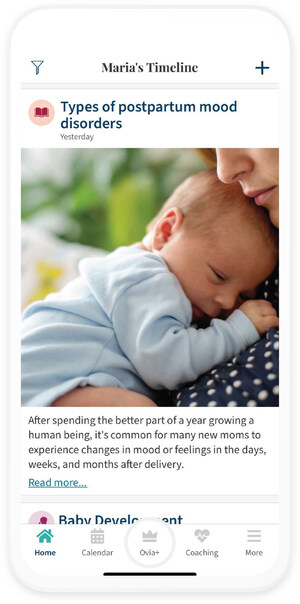Ovia Health Presents Groundbreaking Women's Health Research at 2019 American College of Obstetricians and Gynecologists (ACOG) Annual Meeting
Ovia Health's clinical research team presented four original research studies that aim to help women have healthier pregnancies
BOSTON, May 16, 2019 /PRNewswire/ -- Ovia Health, the most loved and trusted health companion for women and families, presented four research abstracts focused on improving health outcomes for pregnant women at the 2019 annual meeting of the American College of Obstetricians and Gynecologists (ACOG) in Nashville, TN.
Two abstracts used millions of data points to create machine learning models that detect preeclampsia and risk of preterm delivery. The preeclampsia detection model included data points such as exercise, health symptoms, and blood pressure readings. The model had a positive predictive value of 75% and a sensitivity of 37%. When the model was adjusted to reduce the positive predictive value down to 65%, the sensitivity increased to 79%.
The preterm delivery risk model had a positive predictive value of 75% and a sensitivity of 41%. The data points most influential to the model included health symptoms; whether the pregnancy was a single or multiple gestation; the frequency and type of healthcare appointments scheduled; personal health history information; and demographic information including age and BMI.
Preeclampsia and premature birth are two of the most devastating results of pregnancy. These machine learning models can be leveraged as a cost-effective way to significantly improve clinical outcomes and save lives.
The other abstracts presented aimed to better understand barriers to receiving lifesaving treatments. While many preterm deliveries happen spontaneously, there are several known risk factors, such as carrying multiples or a history of preterm delivery. There are also interventions that can be applied to reduce the risk of delivering preterm — namely universal cervical length measurement and progesterone prescription and compliance. Ovia Health deploys these interventions in our Preterm Avoidance Clinical Programs.
Among a sample of more than 2,000 women, 63% reported that their provider had not measured their cervical length. When asked what the greatest barrier to cervical length measurement was, women reported that their provider had not mentioned it and they were uncomfortable raising the topic themselves. As for progesterone access, the barriers to obtaining a prescription among women who are indicated for its use were: 1) disbelief in the efficacy of the medication; 2) concerns about cost or coverage; and 3) discomfort discussing a prescription with their provider.
In recent years, significant evidence has shown that daily low-dose aspirin taken by women with cardiovascular risk factors can reduce the chance of developing preeclampsia. When asked whether low-dose aspirin is safe during pregnancy, only 19% of women agreed. Less than half of pregnant women reported that they would take a medication recommended by their healthcare provider without any hesitation.
This research shows that providers are not offering certain screenings and treatments as often as they need to be, and that patients are apprehensive about suggested treatments, regardless of their proven efficacy. In order for patients to get the care and services they need, they need to be better educated about the importance of self-advocacy and the efficacy of these lifesaving interventions.
Since 2012, Ovia Health has helped over 12 million women and families on their journeys to parenthood, and regularly conducts research to improve care for women and families with established academic and research organizations. For more information about Ovia Health health, visit www.oviahealth.com.
Contact: |
Sarah Coppersmith |
SOURCE Ovia Health

Related Links
WANT YOUR COMPANY'S NEWS FEATURED ON PRNEWSWIRE.COM?
Newsrooms &
Influencers
Digital Media
Outlets
Journalists
Opted In





Share this article